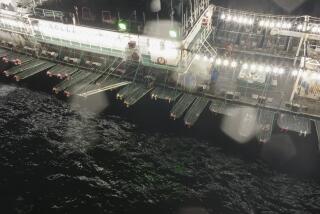Soviet Tall Ship Sails Amid Sea of Troubles : Expedition: Re-creation of a 1741 voyage proves costly, frustrating--and fun.
SEATTLE — For Capt. Yuri Arsentiev and his crew, life aboard the Soviet tall ship Pallada this week has been a cruel reminder of life back home: a shortage of food, fuel and cash.
The 356-foot, three-masted training vessel, stranded at dockside here since Sunday, was finally ready to set sail after being refueled Friday afternoon, thanks to generous local businesses and residents.
The ship’s departure had been delayed after a financial mix-up developed with Russian America 250, the Vladivostok company that chartered the Pallada and three scientific research ships. The three-month expedition commemorates the 250th anniversary of the 1741 voyage of two Russian frigates to what is now the U.S. West Coast.
Arsentiev said the charter company was supposed to pay for the entire expedition, including its next port of call in San Francisco.
But Alexander Malyshev, co-chairman of the expedition, said he has paid all money due the Pallada and the other ships and said his company’s contract with them ended Sunday.
In the end, local businesses and citizens bailed out the Pallada, advancing money for fuel, supplies and other expenses.
The vessel’s 120 young Soviet cadets, training to be engineers, navigators and captains, got daily visits from Seattle-area female admirers offering moral support, friendship and even a few marriage proposals.
Dan Danilov, a Seattle immigration attorney, hosted Arsentiev and two assistants for dinner at a posh restaurant. Danilov loaned the captain his car so he could make runs for food and supplies.
Arsentiev, in turn, invited Danilov to sail with him to San Francisco.
The cadets had mixed feelings about returning home, Danilov said.
“They have tasted better freedom and democracy, pizza pie, hamburgers and met beautiful young ladies. These vices are hard to give up, you know,” Danilov said.
About 10 cadets have asked Danilov about asylum, but he told them their chances were slim because of reforms under way in their homeland.
“They mentioned troubles in the Soviet Union and said there’s not going to be enough food in the wintertime.
“I said, ‘This is common to many countries. If you go back, you can rebuild your country. The bad guys are out and the good guys are in. Do like we did 200 years ago and rebuild the country.’ ”
More to Read
Sign up for Essential California
The most important California stories and recommendations in your inbox every morning.
You may occasionally receive promotional content from the Los Angeles Times.










